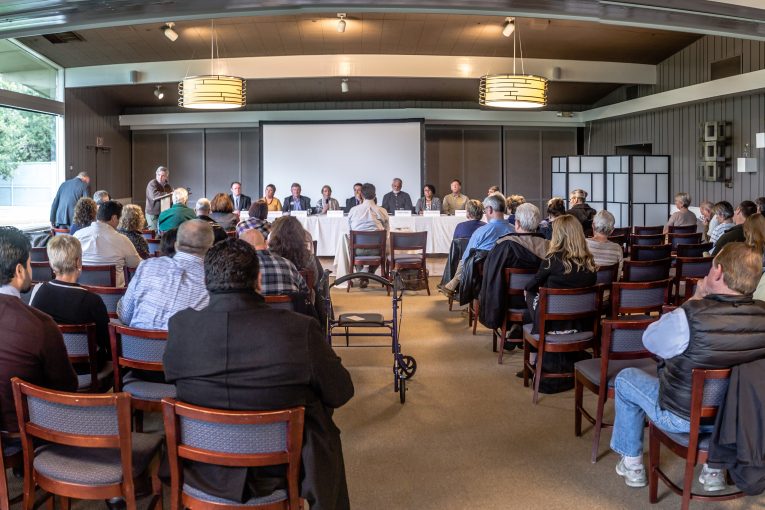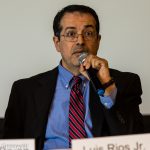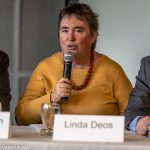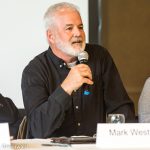

Eight of the nine Davis City Council candidates met on Wednesday at the ChamberPac Forum, with Colin Walsh standing in for the ninth candidate, Ezra Beeman.
The first three rounds of questions had each candidate asked a separate question and given 90 seconds to respond.
 Luis Rios – You bill yourself as the education candidate, how’s that helpful to the average voter in Davis?
Luis Rios – You bill yourself as the education candidate, how’s that helpful to the average voter in Davis?
I went to UC Davis as an undergraduate. The University of California, Davis provides a lot of jobs for a lot of residents here in Davis and Yolo County. UC Davis was founded first as you know, if you look at Yolo County, we’re surrounded by agriculture. I drove a 18 wheeler hauling Roma tomatoes for the Romingers for Beeman farms actually, that was a good summer job when I was at UC Davis. So I understand the community, I understand that education, industry and agriculture are three elements of Yolo County. I value education – public schools especially – I have a PhD and I really want to emphasize that the same kids that go shopping downtown with their parents, that go to the city parks, that go to the events, are the same kids that are in our public schools. Recently with the shooting in Florida, a lot of parents are very concerned citywide, not just the school districts. Citywide this is a public education effort. So I really want to push civic engagement for our youth, for the future.
 Mary Jo Bryan – You have been passionate about senior issues – what other issues rise to the fore for you?
Mary Jo Bryan – You have been passionate about senior issues – what other issues rise to the fore for you?
I started off mainly with the senior issues about ten years ago when I got involved in Choices For Healthy Aging. We were looking at things that seniors would like to do as they wanted to downsize. But as I got more involved in that as a housing issue, I became very much aware of how large of a social issue housing was becoming. And housing for me has become an issue not only for  seniors but for people for disabilities, people that are families first starting out with small children, who are first time homebuyers, or professionals or single people and all those fit into that same category as senior issues. The first thing I was advocating for was single story homes, and small homes in the Cannery. Although we came to some agreement with the builder, they never really got built because of the prices of the land. So I carried this issue onward and I made it broader to include all of the population – that middle range income that needs to find housing in Davis. And I’ve thought, and thought, and thought a lot about this and I’m looking forward to composing and work on some ideas in regards to providing that kind of housing. Being in Davis a long time, I have resources, I know people and know how to talk to them.
seniors but for people for disabilities, people that are families first starting out with small children, who are first time homebuyers, or professionals or single people and all those fit into that same category as senior issues. The first thing I was advocating for was single story homes, and small homes in the Cannery. Although we came to some agreement with the builder, they never really got built because of the prices of the land. So I carried this issue onward and I made it broader to include all of the population – that middle range income that needs to find housing in Davis. And I’ve thought, and thought, and thought a lot about this and I’m looking forward to composing and work on some ideas in regards to providing that kind of housing. Being in Davis a long time, I have resources, I know people and know how to talk to them.
 Dan Carson – What are opportunities that you see specifically about how the university and city can work together?
Dan Carson – What are opportunities that you see specifically about how the university and city can work together?
It’s my understanding that very soon, the campus is going to release its Long Range Development Plan – their equivalent of the general plan for the campus that will go out 10 or 12 years. The numbers that were shared with the city about a year ago, is that it will be a 24 percent increase in the campus population over that period of time. It will put pressure on the housing problems, and the budgetary problems that we’ve all been talking about here. I would like to see us create a sound, two-way working relationship modeled after what’s been able to be achieved in both Santa Cruz and Berkeley. I researched what happened in those locations, shared it with my Finance and Budget Commission, and we in turn communicated to the city council the great deals those two communities got that we think we should go after in negotiations with the campus. We think it can be a positive relationship where both sides succeed. For example the city of Berkeley gets $2 million a year in revenue from the Berkeley campus to help mitigate the impacts from campus growth. But the city of Berkeley also penciled in additional high rise, student housing and innovation space that will help all the city and the university. I’d like to see us go down a collaborative path this time and hopefully avoid the litigation that we had in 2003.
 Linda Deos – Do you support zoning land that’s adjacent to Davis for business purposes?
Linda Deos – Do you support zoning land that’s adjacent to Davis for business purposes?
I think we have to explore all opportunities to expand land either inside or outside be it zoning that’s within our city boundaries or looking at what’s on the outside of our city boundaries. At this point until I have some type of proposal in front of me, I hesitate to say yes or no or anything because we’re just talking about maybe something. But I do support the Nishi project and I did support the first Nishi project in that I was supportive of the commercial aspect to that project. I am much more hesitant to looking at supporting something over here on the Mace Curve because of its distance from downtown and its distance from UC and I think that land should be maintained for what it is – the open space and the protected space for the other critters that we share the world is. There are other parts up by the hospital by where the West Davis Active Adult is going in – that land is not the best for farming. So perhaps that would be an area to take a look at. Am I open to it? I’m open to hearing everything. But I’m hesitant to say that I’m going to go yes on something that I don’t see.
 Colin Walsh on behalf of Ezra Beeman – Why are there so many vacant storefronts in the Davis Downtown and do you have any suggestions about how to improve that?
Colin Walsh on behalf of Ezra Beeman – Why are there so many vacant storefronts in the Davis Downtown and do you have any suggestions about how to improve that?
There could be a lot of reasons, but I’ve not had the chance to inquire about the exact and duration and terms for the second street properties to inform my understanding. But I can speculate that the expectation of large increases in height in our downtown and major associated redevelopments could be increasing rents and shortening available contract durations. I’ve found there to be plenty of available office space personally and am very pleased with our office in Mansion Square. I think we can improve occupancy by helping through market research identify gaps in the market and marketing these to potential business owners.
 Eric Gudz – Do you have some comments about parking and what we should consider to improve parking the situation in Downtown?
Eric Gudz – Do you have some comments about parking and what we should consider to improve parking the situation in Downtown?
Putting on my transportation scholar hat and the work that I’ve done at UC Davis with understanding the dynamics of our transportation in and out of this community as well as in the greater Sacramento region. I can tell you first and foremost, that one of the major reasons why we have so much congestion and traffic and parking issues downtown is because we have almost 20,000 commuters that are coming in and out of Davis on a daily basis during our workdays. Because we’re not able to properly house and hold onto all of our community members within the borders of Davis, what’s happening is a lot of folks like my age are working in the restaurants, work in the bars, maybe they’re teachers, maybe even cops that can’t even live in Davis, they’re having to 40, 50, 60, 70 minutes there and back every single day. Most of those folks are taking cars, they’re not using or able to afford or get into the essentials of mass transportation and public transportation. So what’s happening is that you have an incredibly large amount of personal vehicles that normally would not be downtown because we’re not able to house our population appropriately that are then filling up the parking spots that are then causing us to spend 10 to 20 minutes circulating looking for parking. They’re threatening our sustainability goals for us to be able to achieve a carbon free future in 2050. So we need to be able to address and see the linkages between land use and transportation are critically important and things that I’ve studied personally within my research at UC Davis.
 Larry Guenther – How do you develop internal housing in a way that is acceptable to the neighborhoods but also meets the goal of housing in Davis?
Larry Guenther – How do you develop internal housing in a way that is acceptable to the neighborhoods but also meets the goal of housing in Davis?
I was involved in my neighborhood about putting up a proposal about a mixed-use building. It would have been the biggest mixed-use building in Davis and put 40ish people where there weren’t any. So the densification thing. I think the J/R thing – I am in favor of it. The problem with it is, we’re asking people to vote on the very places that have no zoning. Putting together citizen groups with the stakeholders involved early in the process. I mean early in the process, when you’re still drawing on napkins, when it’s easy and cheap to change a project. Putting a group together to work with developers who are trying to get a Measure J/R vote, so that by the time it goes through the commissions, what is desired by the stakeholders and what is desired by city policies is already part and parcel. And by the time it gets to a vote, it’s been vetted by the city and by the community. Densification – I’m on the downtown advisory committee, and I’m all in favor of going higher in the middle and coming out with mixed use buildings all over downtown.
 Gloria Partida – What do you think needs to be changed, inside city hall to make the business process better?
Gloria Partida – What do you think needs to be changed, inside city hall to make the business process better?
The city has to do more collaborating, to do more outreach to UC Davis and find ways to be more creative about getting businesses into our area. UC Davis just made a deal with Sacramento for a huge innovation park. We couldn’t’ do that here because we couldn’t build on the land that we had here. I think the city just has to do a better job of finding spaces for businesses that want to survive in our city. I think that we can work better with some of the businesses who are having to come up with a huge amount of fees, we can look at the fee schedules and see if we can adjust them so maybe smaller businesses can some sort of grading so that we can get more business owners into town.
 Mark West – Why didn’t the innovation center proposals survive and what do we need to do to increase economic sustainability?
Mark West – Why didn’t the innovation center proposals survive and what do we need to do to increase economic sustainability?
The basic problem for why we’re not getting these commercial developments to come on line is the financial risks are just too great. We set up a system that makes it to expensive to bring in a project and get it built. We saw that with the first Nishi project where they spent millions of dollars getting that project up to a vote and then we voted it down. Now that’s a sunk cost that those developers had to deal with for the second time around. Honestly I think there’s an expectation in town that developers have unlimited resources which just isn’t true. We need to re-look at what we’re demanding of businesses up front. Those upfront costs and see if we can prioritize and reduce some of those costs to reduce the financial risks to get projects built. My personal belief is that we need to get rid of Measure R. But that’s the thing that’s preventing us from getting proposals brought to us – but there’s other ways that we could address the issue. One idea would be for the city to make the decision to annex the land and have the EIR done and set up the zoning on the new land so it’s a city expense to go through a lot of that upfront cost and then allow the developer to come in on an individual project basis and work things out.


I don’t see the purpose in asking each candidate a separate question . . . were these randomly chosen? How does one compare views when each answers on a different subject?
I agree.